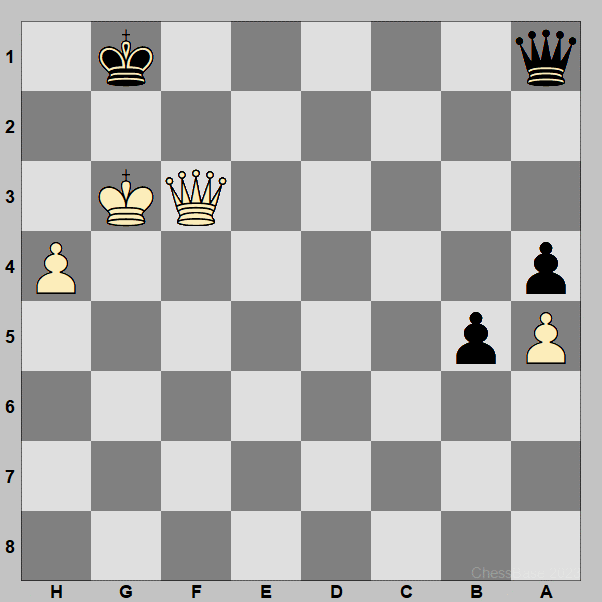
Challenge 2500 | 10. Training Continues
In this post, I'll recap how this project has been going so far, set some goals and intentions for the future, and discuss my current training regime. Hope you enjoy the read!Some time has passed since the last blog entry of this series, which concluded a period of tournament play, and I am now involved into a schedule based on non-chess-related matters.
Nonetheless, the goal of reaching a classical rating of 2500 still stands! And so I am back to training daily, working on becoming a better chess player.
Before we delve into the main topics of this post, and to spice up this blog entry a bit, let's include some actual chess content. Here's an endgame study I composed earlier this year:

Black to move and win!
If you happen to be part of my modestly sized twitter following (https://twitter.com/jakob9876), you might have seen it already. Feel free to try and solve it, the solution is at the end of this blog post. It's nothing special, but I am quite happy with it, as I rarely ever try composing studies. This one was inspired by a blitz game of mine.
Recapitulating the journey so far
Given that this is the 10th entry of this blog series, and that it's been a while since its last entry, let's take the time to summarise and review how the journey has been going so far.
To do this, let's sum up the tournament play since starting this project:
- RP 2324 / -4.8 (Bremer Silvester Open 2022)
- RP 2511 / +11.1 (2023 Staufer Open)
- RP 2445 / +3.0 (24. NordWest-Cup Open)
- RP 2334 / -4.2 (Int. Dolomitenbank Open Lienz)
- RP 2461 / +4.9 (ChessOrg Schachfestival Bad Wörishofen)
- RP 2511 / +12.4 (SixDays Budapest March 2023 GM)
- RP 2402 / -1.5 (CIS 2023 [Sicilian League])
Additionally, I had 4 games in the 2. Bundesliga, where I scored 2/4 against a rating average of 2412.5.
In total, that's 59 classical games with an average game performance of 2430.44.
Having started this challenge at 2407 (after having gained some rating throughout 2022, which motivated me to start this project), I'm now up 20 rating points after this first period of tournament play, sitting at 2427.
All in all, it seems adequate to be happy with the progress so far, while also realising that significantly better performances are needed in order to make serious ground from here. A reasonable goal for the next string of tournaments would be an average performance rating of 2450+. I'll do my best to accomplish that.
Let's also briefly analyse the numbers above and extract some positives and negatives:
Positive
Decent stability. It is basically impossible to avoid bad tournament results altogether: once in a while, things are bound to go wrong. When that happens, making sure that they don't go terribly wrong is incredibly important. You've got to avoid tilt, as they say.
The fact that my worst performances were around 2325 is not too bad. This resulted in losing at most 5 rating points in tournaments that didn't go according to plan.
Obviously it would be nice to raise the floor a little higher, but it seems to me that I should primarily work on raising the ceiling, since...
Negative
It's clearly not sufficient long-term for my best performances to barely break 2500.
As reaching a rating of 2500 is the goal, that number also has to become the performance average at some point along the way, and that has to be achieved primarily by significantly raising those peak performance ratings, let's say to 2550+ or ideally even 2600+.
I'll attempt to do this by playing better chess of course, but also by trying to play stronger opposition.
My opponents in those 59 games had an average rating of ~2263, which is not too bad, but it should be higher ideally.
Competing against higher-rated chess players should be more conducive to great rating performances than playing mostly lower-rated players. For this reason, I'll try my best to schedule some really strong tournaments for the summer.
Current training routine
I'm keeping my current routine simple, as, for the most part, I do the same things every day:
- 25 min. Tactics on ChessTempo (Problem set: Blitz, Difficulty: Medium)
- 50 min. Tactics on Lichess (Standard puzzles)
- 4 Blitz games (3+2)
- 4 Blindfold blitz games (5+0)
This is the core of my current routine, but additionally, I play a couple of training games on a weekly basis. At the moment, I have 4 games of 5+3 scheduled against a FM and 2 games of 10+5 against a fellow IM per week.
Two main reasons/intentions:
- Avoiding rust; I don't want to continue my tournament play in the summer after barely having played any tough, competitive games in over 3 months. This weekly dose of rapid chess should keep my instincts fresh, at least to a certain degree. And while one could certainly argue about how effective these roughly 1.5 hours a week are, it's certainly better than doing nothing (this is a trivial point, but doing just a tiny bit of something over a prolonged period of time is worlds better than doing nothing)
- Improving intuition and sharpness; as I've come to realise over the course of time, I make too many grave mistakes in critical positions with little time on the clock. Of course, this is arguably 'only natural', but that doesn't mean it can't be improved upon.
My favorite part of training are the Lichess Puzzles. I am now at a rating where I get many devilishly difficult puzzles, and it's really fun to set them up on an actual physical board, sit down and begin to unravel the mysteries of the position at hand... or at least try to (just today, I failed to solve any of the four puzzles Lichess had in store for me. Admittedly, that was rough... let's just say, usually this part of training is fun).

No reason not to train outside when the weather plays its part!
I've started to collect some of the coolest puzzles I stumble across in this study (be warned though, they are not easy at all):
I've heard some criticisms of Lichess puzzles, mentioning their being computer-generated as a negative aspect, but I am a huge prononent of that. There are so many amazing ideas and motives waiting to be uncovered, especially in the more difficult puzzles, and I think they can really improve one's calculation ability (if one seriously attempts to solve them).
I'll very likely keep this in my routine for a long time.
Regarding openings, I am considering beginning to utilise Online Courses, simply because building one's own repertoire (which is what I've done so far) is so incredibly time-consuming.
I'd probably purchase some high-quality courses, take those as a basis and then, if needed, adapt/enhance them slightly where I see fit. This should reduce the time spent on openings considerably, which is a huge plus for me.
Outlook
Im currently looking out for tournaments to play in August, September and early October. So far, just two are planned:
- 05.08.-12.08. Vlissingen Open (https://www.hztoernooi.nl/index.php/en/)
- 29.09.-07.10. Münsterland Open (https://www.sk32.de/de/openanmeldung)
I'm also looking forward to something very special: our team promoted to the Bundesliga last season (https://schachklub-hannover.de/hsk-lister-turm-feiert-historischen-aufstieg-die-schachbundesliga-nach-31-jahren-erfolg-ohne), so there is a good chance I'll be facing many strong grandmasters there. Can't wait!
W.r.t. this blog series, I'll likely write one more training-based entry, and after that, once the next period of tournament play begins around August, a bunch of tournament recaps can be expected.
To finish this post up, here's the solution to my little endgame study:

Thank you all for reading and following along.
I've received a couple of encouraging messages regarding this series, and I can't thank you enough for those, they truly make my day! (I realise I might be sounding slightly corny right about now, but I'll risk it)
Cheers, have a great day!
More blog posts by iakov98

Challenge 2500 | Almost halfway there!
After Vlissingen, I competed in two more tournaments in August. In this brief article I summarise th…
Challenge 2500 | 11. Vlissingen
Tournament play continues! Reviewing my tournament result in Vlissingen; one more step forward on my…
How do you visualise chess positions?
I'm exploring the topic of how chess players visualise positions and would like to write a post abou…